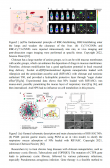Advances in therapeutic nano-drug delivery systems in infectious lung diseases: a review
Abstract
Infectious lung diseases are primary or secondary lung inflammatory diseases caused by infectious agents such as bacteria, viruses, or fungi. Oral or intravenous administration of antibiotics is the most common treatment method, but some drugs suffer from poor release stability, high systemic toxicity, and induction of drug resistance. Nano drug delivery systems (DDS) are promising alternatives for the treatment of pulmonary infectious diseases, with particular advantage in enhancing drug delivery stability and solubility, improving pulmonary accumulation, reducing systemic toxicity, and combating drug resistance. This review provides a brief overview of the mechanisms and classification of pulmonary infectious diseases, outline new approaches and ideas for representative pulmonary drug delivery methods in recent years, and briefly summarized the toxicity of the present pulmonary nano-drug delivery systems. We believe that nano-based therapeutic strategies will provide great potential to broaden the scope of treatment of infectious lung diseases and enhance the therapeutic efficacy.


